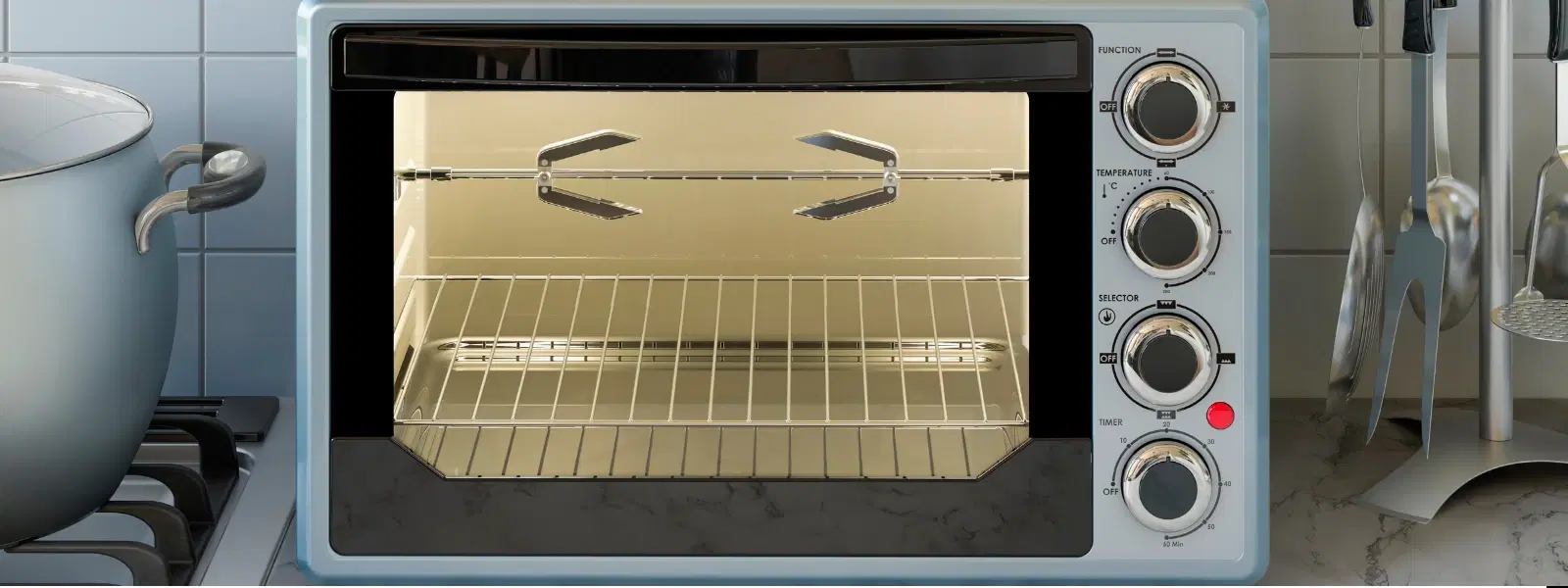
Home Appliances
•03 min read
Microwaves have become a staple in modern kitchens, offering convenience and efficiency. However, questions often arise about using aluminum foil in microwave ovens. This blog post will answer common FAQs surrounding the use of aluminum foil in microwaves, shed light on the underlying science, and share practical tips for safely utilising aluminum foil when necessary. By the end, you will understand whether aluminum foil is microwave-safe, what happens if you microwave aluminum foil incorrectly, and how to use foil in microwave safely with clear guidelines.
Aluminum foil does not absorb microwave radiation. Instead, it reflects the energy, which can cause arcing or sparks in your microwave. This happens because the metal’s electromagnetic properties cause the microwaves to bounce off rather than penetrate, leading to potential risks such as fire or damage to your appliance.
In specific and controlled scenarios, small, smooth pieces of aluminum foil may be used to shield certain areas of food from overcooking. However, using aluminum foil in the microwave without proper precautions can lead to electrical damage. It is vital to ensure that the foil does not touch the walls or the base of the microwave. Adhering to strict guidelines is key to mitigating any microwave aluminum foil safety risks.
When using aluminum foil in a microwave, sparks often result from a process called arcing. This phenomenon occurs when crumpled or uneven pieces of foil concentrate microwave energy in one spot, leading to intense heat and even small bursts of fire. Understanding this helps in recognising the dangers of aluminum foil in microwave use.
The dangers include potential damage to the microwave’s interior components such as the magnetron, alongside the risk of causing a fire or injury. In some cases, food contamination may occur if the foil overheats, which can compromise the quality and safety of your meal. This highlights why many experts advise caution when considering using aluminum foil in microwave recipes.
If you decide to use aluminum foil in your microwave, keep the foil as smooth as possible and avoid crumpling it. Use only small pieces to cover specific areas, such as the edges of food that may overcook. Importantly, ensure that the foil does not come into contact with the microwave’s walls or base. Following these guidelines can significantly reduce the risks associated with using aluminum foil in microwave ovens.
For effective and safe use, aluminium foil should not be used to completely wrap food. Instead, apply it sparingly for short durations. Whenever possible, consider alternatives to aluminum foil for microwave cooking. Materials such as parchment paper or microwave-safe lids can offer a safer and more reliable solution. These alternatives are designed to work well with microwave radiation without posing the dangers of aluminum foil and microwaves.
There are several excellent microwave-safe materials available. Glass and ceramic containers, microwave-safe plastics, and even paper towels or parchment paper can be used safely in a microwave. These materials absorb microwave energy without reflecting it, thus eliminating the risk of sparks or fire.
Compared to other microwave-safe materials, aluminum foil poses inherent risks due to its reflective nature. While it can be used under cautious conditions, the benefits of switching to materials designed for microwave use are clear. By choosing glass, ceramic, or microwave-safe plastics, you ensure a safer and more efficient cooking process.
Did You Know? Aluminum Foil Can Be Used Safely in Certain Scenarios!
Small, smooth pieces of aluminum foil can be used in the microwave to shield specific parts of food from overcooking. However, it is crucial to follow safety guidelines to prevent sparks or damage to your appliance.
Yes, but only under specific conditions. Use small, smooth pieces and ensure the foil does not contact the microwave’s walls or base to prevent sparks and fire hazards.
Aluminum foil reflects microwave radiation, which can lead to sparks, fires or even damage the microwave’s internal components.
Generally, aluminum is not considered microwave-safe due to the risks it poses, though small, well-handled pieces can be used safely in some instances.
Aluminum trays should not be used unless they are explicitly labelled as microwave-safe. Always follow the manufacturer's guidelines carefully when considering their use.
If not used properly, microwaving aluminum foil can cause sparks, fires, and serious damage to your microwave. It is important to adhere to safe practices when using any metal in a microwave.
Although it is possible to use aluminium foil in microwave ovens under very specific conditions, it is generally best to opt for microwave-safe materials. This careful approach not only protects your appliance but also enhances your overall cooking experience. At Tata Neu, we believe in empowering you with the right information to make safe and smart choices. Enjoy benefits like earning NeuCoins on every smart purchase, and discover how easy and convenient shopping can be. With trusted brands and unbeatable after-sales support, you can always progress in life by shopping smartly and securely.